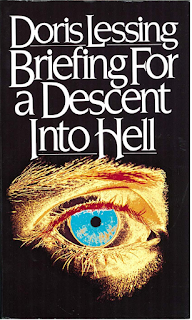 Sometimes when you
read a book or story, the words are dead, you struggle to end it or put it
down, your attention is distracted. Another time, with exactly the same book
or story, it is full of meaning, every sentence or phrase or even word seems to
vibrate with messages and ideas, reading is like being pumped full of
adrenalin.
Sometimes when you
read a book or story, the words are dead, you struggle to end it or put it
down, your attention is distracted. Another time, with exactly the same book
or story, it is full of meaning, every sentence or phrase or even word seems to
vibrate with messages and ideas, reading is like being pumped full of
adrenalin.
The above is a quote from the complex, challenging but
utterly rewarding “Briefing for a Descent into Hell”. This is a novel which has
been described, by some, as science fiction, by Doris Lessing herself as “inner
space fiction”, I will add to that list and call it psychosis fiction.
The novel opens with an unknown patient being admitted to a
mental hospital where two doctors (“x” and “y”) use various drugs and methods
to bring his mind under control and therefore investigate his background. The book consists of roughly two equal parts,
the inner ramblings or thoughts of our unknown protagonist and the later
section consisting of letters back and forth between the doctors and
acquaintances of our subject as his “true” identity becomes clearer , interspersed
throughout with the notes of the two doctors.
I can fully understand how this book could polarise readers with it’s repetitive
ramblings of a “mad man”, ruminations on time:
…when time is slower – as when,
falling of a ladder, one has time to think: I shall land so, just there, and I must turn in the air slightly so my backbone
does not strike that sharp edge. And you do turn in the air, and even have time
to think: this fall may hurt me badly, is there someone in the house to help me
– and so on and so forth. All this in a space of time normally too short for
any thought at all.
the insignificance of the human race, or us as individuals,
the significance of the natural world (Lessing even speaks of the impacts of
melting ice caps, population growth, rampant use of resources and pollution and
the potential long term effects of such and this is four years before
the now well-known term “global warming” was used in the journal “Science”) and
the novel having a lack of a coherent linear plot.
As the novel draws to its conclusion and we learn more and
more of our missing character’s life outside of his mind, the standard
questions of drug treatment for mental illness, shock therapy and opposing
medical views come to the fore. I found these sections less personally relevant
and enjoyed a lot more the broad brush questions of our mind’s inner
machinations and the detailed observations of the mundane day to day encounters
and relationships that we endure.
Definitely not your lazy pool side read, and one you need to
stop and think about every few pages, but a novel I thoroughly enjoyed and as
per “The Big Chapel” one that I personally believe would have been more worthy
of the 1971 prize than “In A Free State” – this one being my choice of the
three I have completed.
Cross posted at my blog.
No comments:
Post a Comment